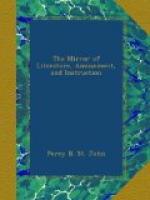All that you read in the works of Wentworth and Cunningham, as to the healthfulness and beauty of the climate, is strictly true. There are scarcely any diseases but what result immediately from intemperance. Dropsy, palsy, and the whole train of nervous complaints, are common enough; but then, drunkenness is the vice par excellence of the lower orders; and the better class of settlers have not learned those habits of temperance which are suited to the climate of Naples. The two classes often remind me of English squires and their grooms, as I used to see them at Florence, just after the peace; masters drinking at dinner, because they were abroad, and after dinner because they were Englishmen; the servants drinking always, because wine and brandy were cheap. Perhaps a generation must pass away before the people here will accommodate their habits to the climate, which is that of Italy, without either malaria or the sirocco.
The soil of New South Wales is not particularly fertile. The plains of the Granges, and of the great rivers of China, the lowlands of the West India islands, the swamps of the Gulf of Mexico, and even the marshes of Essex, produce crops of which the people here have no conception; but then, as we are without great masses of alluvial deposit, so are agues and intermittent fevers absolutely unknown. In point of natural fertility, I am inclined to compare this soil to that of France; and I have no doubt that, if the same quantity of agricultural labour as is employed in France, were here bestowed upon an area equal to the French territory, the quantity of produce would fully equal that of France. Timber, coal, iron, and other useful minerals, abound; the harbours and rivers teem with fish; cattle of all sorts thrive and multiply with astonishing rapidity; every fruit that flourishes in Spain and Italy comes to the highest perfection; and Nature fully performs her part in bestowing upon man the necessaries, comforts, and luxuries of life.
Value of Land, &c.
I was told that an estate of 10,000 acres might be obtained for a mere trifle. This was true. I have got 20,000 acres, and they did not cost me more than 2s. per acre. But I imagined that a domain of that extent would be very valuable. In this I was wholly mistaken. As my estate cost me next to nothing, so it is worth next to nothing. It is a noble property to look at; and “20,000 acres in a ring fence,” sounds very well in England; but here, such a property possesses no exchangeable value. The reason is plain: there are millions upon millions of acres, as fertile as mine, to be had for nothing; and, what is more, there are not people to take them. Of my 20,000 acres I reckon about 5,000 to be woodland, though, indeed, there are trees scattered over the whole property, as in an English park. For my amusement, I had a rough estimate made of the money that I could obtain for all this timber, were it growing in any part of England. The valuation amounts to above L150,000.




